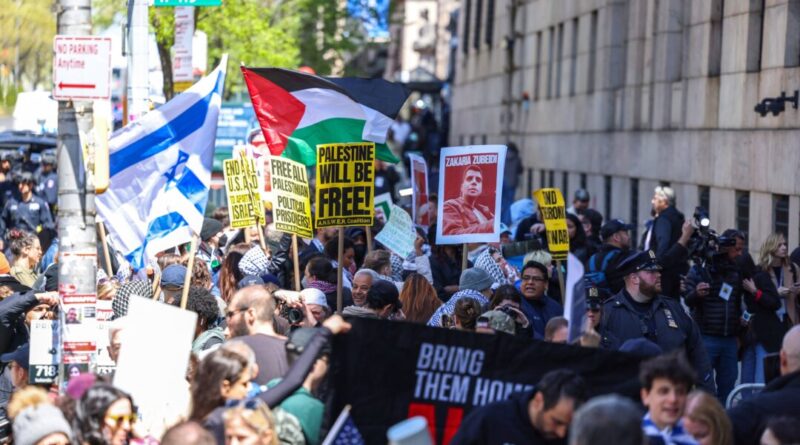Tufts University Calls on Students to Remove Pro-Palestinian Encampment Before Semester Begins
A ‘Gaza Solidarity Encampment’ protest was initiated on April 7 in the academic quad of Tufts University and has been occupying the area since then.
A Massachusetts university is requesting its students to peacefully and voluntarily end a pro-Palestinian encampment protest in order for the school to prepare for the upcoming semester.
On April 7, Tufts University students established a “Gaza Solidarity Encampment” protest in the academic quad and have maintained their presence since. The demonstrators are demanding that the university terminate any business affiliations with Israel and issue a statement denouncing the war in Gaza.
The university leadership expressed that they have made efforts to accommodate the protesters and acknowledge “our community members’ right to advocate for their beliefs.”
“However, the encampment must now come to an end, ideally through peaceful and voluntary means, to facilitate preparations for Commencement,” the letter stated.
“Student Life staff will be in contact with the protesters tomorrow morning to arrange for the conclusion of the encampment in the following days.”
Pro-Palestine Group Maintains Stance
Shortly after the release of the open letter, one of the protesting groups, Tufts Students for Justice for Palestine, shared an image on Instagram reaffirming their demands. Specifically, they insist that the university sever ties with all Israeli-affiliated businesses, including discontinuing the sale of Sabra and other Israeli products at Tufts dining locations, and issue an apology for previous statements.
The demands were shared with a message stating, “Heed our resolutions. We will not depart until our demands are acknowledged.”
As per Tufts University leadership, since the campus protests commenced in October, Student Life personnel have been trying to maintain communication with the protesters to ensure the campus functions smoothly and the community remains safe.
“However, recent interactions have taken a different turn as the protesters have increasingly sought to escalate and disrupt normal university operations. Following interactions with Student Life staff, false accusations of threats and intimidation have been posted on the protesters’ social media accounts,” stated the open letter.
“It must be emphasized that these allegations are unfounded and seem to be aimed at stirring up tensions within the community by distorting the reality of the situation.”
The university highlighted that the protesters’ actions are now encroaching upon the rights of other students. Following a demonstration last Friday, student organizers requested a meeting with university leadership.
“Their request, along with a threat to continue disruption, comes after they have ramped up their activities, intentionally caused harm to our community and campus, breached multiple university policies, and, most importantly, violated the institution’s values and norms,” conveyed the university leaders.
“As we have mentioned previously, we are deeply concerned about the significant loss of life among Palestinians and aim to collaborate with all members of our community to support both the Palestinian and Israeli populations.”
Protests Extend to University Campuses Nationwide
Protests have spread across university campuses in the United States and globally since Hamas’ attack on Israel on Oct. 7, 2023, leading to a violent clash, followed by Israel’s decision to launch a military operation to neutralize Hamas’ capabilities in Gaza.
The Hamas-led attack resulted in approximately 1,200 casualties in Israel, predominantly civilians. As per the Hamas-controlled Health Ministry in Gaza, around 34,000 Gazans have lost their lives since the conflict began. While the ministry does not differentiate between combatants and non-combatants in its death tolls, there has been mounting international criticism due to the high number of casualties in Gaza.
Israeli Prime Minister Benjamin Netanyahu labeled the ongoing protests as “horrific” and drew parallels to the early stages of Nazi influence in German universities in the 1930s.
Independent presidential candidate Robert F. Kennedy Jr. expressed his views on the matter, stating after a campaign event in New York that he supports the right to protest but opposes calls for a ceasefire in Gaza.
“I believe in free speech. Even when speech is offensive, reprehensible, or illogical, people should have the right to express their grievances,” he said.
“I fail to see how individuals can call for negotiations amidst ongoing ceasefire violations by Hamas, enabling them to rearm, regroup, and stage surprise attacks on Israel.”
Mr. Kennedy also condemned anti-Semitic threats against Jewish students on campuses as “unacceptable” and urged universities to protect all students, just as they have in the past for others.
“If universities aim to safeguard non-white individuals from mistreatment because it fosters a sense of insecurity, they must extend the same protection to Jewish students,” he remarked.





